Sleep and Eye Health
How Sleep Affects Your Eye Health
FSDAVCFEBFEVSDDVFSD
FSDAVCFEBFEVSDDVFSD
FSDAVCFEBFEVSDDVFSD
The Connection Between Sleep and Eye Health
A good night’s sleep is vital for overall well-being, including eye health. Adequate rest allows your eyes to stay hydrated, maintain tear production, and recover from daily exposure to screens, artificial lighting, and environmental irritants. Without sufficient sleep, your eyes may struggle to perform these essential functions, leading to discomfort and strain.
Poor sleep has been linked to common eye problems like dry eye syndrome, eye strain, and even a heightened risk of myopia progression. Recognizing the connection between sleep and eye health empowers you to take proactive measures, such as improving sleep quality, to preserve clear, comfortable vision and support overall eye wellness.
A good night’s sleep is vital for overall well-being, including eye health. Adequate rest allows your eyes to stay hydrated, maintain tear production, and recover from daily exposure to screens, artificial lighting, and environmental irritants. Without sufficient sleep, your eyes may struggle to perform these essential functions, leading to discomfort and strain.
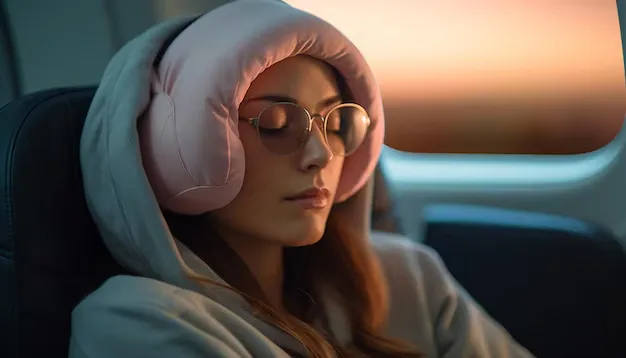
Poor sleep has been linked to common eye problems like dry eye syndrome, eye strain, and even a heightened risk of myopia progression. Recognizing the connection between sleep and eye health empowers you to take proactive measures, such as improving sleep quality, to preserve clear, comfortable vision and support overall eye wellness.

How Poor Sleep Impacts Vision
Many people are unaware that sleep deprivation can have long-term consequences on eye health. Insufficient sleep disrupts the delicate balance needed to maintain optimal vision and eye comfort. One common effect is increased dry eye symptoms. Sleep deprivation reduces tear production, leaving the eyes dry, itchy, and irritated. Tears play a vital role in protecting the cornea and maintaining comfort, and without sufficient rest, the eyes struggle to stay properly hydrated.
Sleep deprivation also contributes to eye strain and fatigue. When the body is tired, the eye muscles find it harder to focus, resulting in blurry vision and discomfort, particularly during activities like prolonged screen use. This can significantly impact daily productivity and quality of life, especially for those who rely on screens for work or study.
Additionally, research suggests that inadequate sleep increases the risk of myopia progression, particularly in children and teenagers. The eyes require rest to regulate growth and function effectively, and chronic sleep deficits may contribute to worsening nearsightedness over time. For those facing persistent dry eye symptoms, seeking professional dry eye treatment can provide relief by improving comfort and tear stability. Taking proactive steps to improve sleep quality is essential for protecting long-term eye health and overall well-being.
The Role of Blue Light in Sleep Disruptions
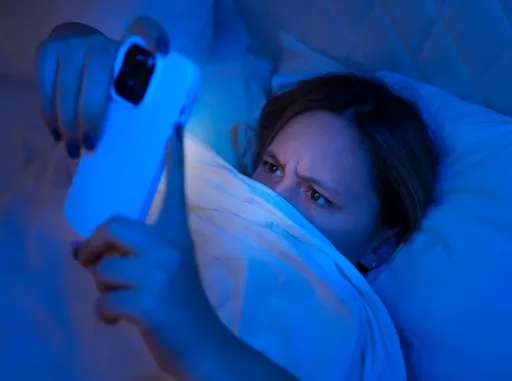
Exposure to blue light before bedtime can negatively impact sleep quality. Devices like smartphones, computers, and TVs emit blue light, which suppresses the production of melatonin, a hormone essential for regulating sleep. When melatonin levels drop, it becomes harder to fall asleep and stay asleep, disrupting the body’s natural sleep-wake cycle. This can lead to insufficient rest, affecting overall health and well-being.
To improve sleep quality, it’s important to limit blue light exposure in the evening. Simple strategies include enabling night mode settings on devices, using blue light-blocking glasses, or reducing screen time at least an hour before bed.

Creating a bedtime routine that prioritizes relaxation, such as reading a book or practicing mindfulness, can further promote restful sleep. By managing blue light exposure, you can support better sleep patterns and maintain your overall health and productivity.
Limiting blue light exposure in the evening is essential for improving sleep and reducing eye strain caused by digital screens. The blue light emitted by devices like smartphones, tablets, and computers interferes with melatonin production, disrupting the body’s natural sleep-wake cycle. This can lead to difficulty falling asleep, restless nights, and long-term effects on overall well-being. Additionally, prolonged exposure to blue light can strain the eyes, causing discomfort, headaches, and even blurred vision, especially during extended screen use.
To minimize the impact of blue light, incorporating protective measures into your daily routine is key. Using blue light-blocking lenses can significantly reduce eye strain by filtering out harmful wavelengths. Enabling night mode or “dark mode” on devices is another effective way to reduce blue light exposure, especially in the evening. Taking regular breaks from screens, practicing the 20-20-20 rule (looking 20 feet away for 20 seconds every 20 minutes), and avoiding screen time at least an hour before bedtime can further enhance eye comfort and sleep quality. By adopting these habits, you can protect your vision, ensure restful sleep, and maintain overall health in today’s screen-driven world.
Tips for Better Sleep and Eye Health
Making small adjustments to your daily routine can significantly enhance both sleep quality and eye health. Following a consistent sleep schedule helps regulate your body’s natural sleep-wake cycle, promoting restful nights and reducing the risk of fatigue-related eye strain. Limiting screen time at least one hour before bed minimizes exposure to blue light, which can disrupt melatonin production and negatively affect sleep. This simple habit can improve your ability to fall asleep and wake up feeling refreshed.
For those who experience dry or irritated eyes upon waking, incorporating artificial tears into your routine can provide relief and support eye hydration. Proper hydration throughout the day is equally important, as dehydration can contribute to dry eye symptoms. Drinking adequate water ensures your eyes maintain the moisture needed for comfort and protection. By adopting these habits, you can take proactive steps to improve your vision and overall well-being, ensuring clear, healthy eyes and better sleep.
Myopia and Sleep: What You Should Know
Insufficient sleep has been linked to faster myopia progression in children and teens. Sleep is essential for regulating eye development, and inadequate rest may disrupt normal growth patterns, increasing the risk of worsening nearsightedness. Quality sleep is critical for maintaining healthy vision during these crucial developmental years.
Parents can support their children’s eye health by ensuring they get enough rest each night.
Insufficient sleep has been linked to faster myopia progression in children and teens. Sleep is essential for regulating eye development, and inadequate rest may disrupt normal growth patterns, increasing the risk of worsening nearsightedness. Quality sleep is critical for maintaining healthy vision during these crucial developmental years.
Parents can support their children’s eye health by ensuring they get enough rest each night. Establishing a consistent bedtime routine and minimizing evening screen time can help improve sleep quality and reduce strain on young eyes. These habits are vital in slowing the progression of myopia.
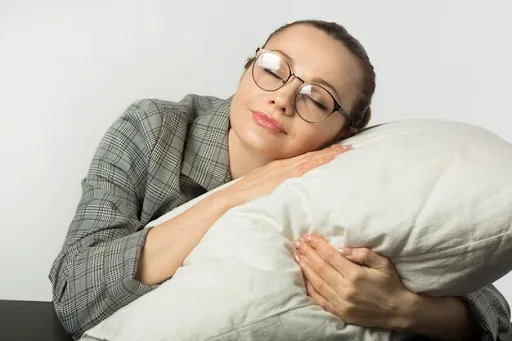

Orthokeratology (Ortho-K) lenses provide an additional solution. Worn overnight, they gently reshape the cornea to slow myopia progression while offering clear vision during the day without glasses. Combining healthy sleep habits with Ortho-K ensures comprehensive vision care for growing children.
Establishing a consistent bedtime routine and minimizing evening screen time can help improve sleep quality and reduce strain on young eyes. These habits are vital in slowing the progression of myopia.
Orthokeratology (Ortho-K) lenses provide an additional solution. Worn overnight, they gently reshape the cornea to slow myopia progression while offering clear vision during the day without glasses. Combining healthy sleep habits with Ortho-K ensures comprehensive vision care for growing children.
Protecting Your Eyes While You Sleep
Creating a healthy sleep environment is essential for maintaining both quality rest and optimal eye health. Keeping your bedroom dark can significantly enhance sleep quality, allowing your eyes to rest and recover. Light exposure during sleep can disrupt melatonin production, preventing deep, restorative sleep and leading to unnecessary eye strain. Blackout curtains or an eye mask can be helpful in ensuring a dark sleep environment.
For those who wear contact lenses, it is crucial to avoid sleeping in them. Wearing contacts overnight increases the risk of eye infections, as it limits oxygen flow to the cornea and creates a breeding ground for bacteria. Always remove your lenses before bed, and consider switching to daily disposables or Orthokeratology (Ortho-K) lenses for a safer alternative.
If you wake up with dry or irritated eyes, especially in dry climates or during colder months, using a humidifier can help. Dry air can worsen symptoms of dry eye syndrome by reducing moisture levels in the room. A humidifier restores hydration to the air, promoting better tear production and reducing overnight dryness. Combining this with artificial tears as needed can further enhance comfort.
Taking these steps to improve your sleep environment will not only enhance your rest but also protect your vision. A dark, comfortable bedroom, proper contact lens hygiene, and adequate humidity levels can make a significant difference in maintaining healthy eyes. By prioritizing both sleep and eye care, you can wake up feeling refreshed and ensure your eyes are ready for the day ahead.
When to See an Eye Doctor
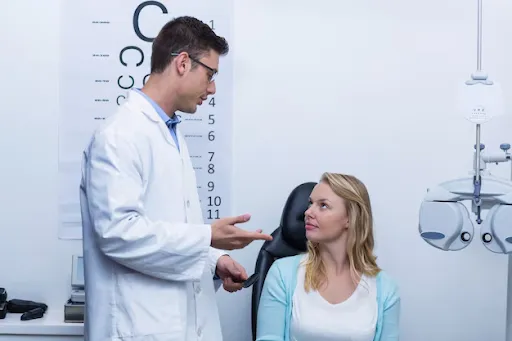
Frequent dry eyes, blurry vision, and eye strain can often be linked to inadequate sleep, which disrupts your eyes’ natural recovery process. Poor sleep reduces tear production and impacts the eye muscles, leading to discomfort and vision problems. Recognizing these symptoms early is essential to prevent long-term issues with your eye health.

Frequent dry eyes, blurry vision, and eye strain can often be linked to inadequate sleep, which disrupts your eyes’ natural recovery process. Poor sleep reduces tear production and impacts the eye muscles, leading to discomfort and vision problems. Recognizing these symptoms early is essential to prevent long-term issues with your eye health.
A comprehensive eye exam is a valuable step in addressing these concerns. An eye care professional can assess your vision, identify underlying issues, and determine whether factors like poor tear quality, digital eye strain, or uncorrected vision problems are contributing to your discomfort. Such evaluations are crucial for finding the right solutions tailored to your needs.
A comprehensive eye exam is a valuable step in addressing these concerns. An eye care professional can assess your vision, identify underlying issues, and determine whether factors like poor tear quality, digital eye strain, or uncorrected vision problems are contributing to your discomfort. Such evaluations are crucial for finding the right solutions tailored to your needs.
Based on the exam results, your eye doctor may recommend treatment options such as artificial tears, blue light-blocking lenses, or even lifestyle changes to improve your sleep quality. Don’t wait to schedule an eye exam to safeguard your vision and well-being.
Based on the exam results, your eye doctor may recommend treatment options such as artificial tears, blue light-blocking lenses, or even lifestyle changes to improve your sleep quality. Don’t wait to schedule an eye exam to safeguard your vision and well-being.
Prioritize Sleep for Healthy Vision
Quality sleep plays a vital role in maintaining healthy, comfortable vision. During sleep, your eyes recover from daily exposure to digital screens, artificial lighting, and environmental irritants. Lack of rest can lead to dry eyes, blurry vision, and eye strain, making it essential to prioritize adequate sleep each night. Simple habits like reducing screen time before bed and keeping your bedroom dark can support your eyes’ natural healing process.
If you’re experiencing persistent discomfort, professional care can make a significant difference. A comprehensive eye exam can identify underlying issues such as dry eye syndrome or digital eye strain and provide tailored treatment options. Additionally, protective measures like blue light-blocking lenses or artificial tears can reduce strain and promote comfort. By combining quality sleep with proactive care, you can ensure your eyes remain healthy and free from unnecessary discomfort. Contact us and prioritize rest and regular eye check-ups for optimal vision health.

Contact Info
Hours of Operation
Mon - Fri | 9:00 AM - 5:00 PM
Sat - Sun | Closed
Holiday Hours: We are closed for the following holidays: New Years Day, Memorial Day, Independence Day, Labor Day, Thanksgiving Day, Christmas Day
© 2026 Kleinwood Vision. All rights Reserved.

